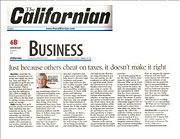Integrity
Matters
November 5, 2003
Just
because others cheat on taxes, it doesn't make it
right

 Question: (E-075)
Question: (E-075)
Dear
Jim:
I
read that the number of Americans surveyed who think tax
cheating "here and there" is acceptable is up 50% in the
past four years. Is that possible? Then I looked further
into the matter and found out the 50% increase is less
scary when it is understood that the difference in the
past four years, since 1999, is simply up from 8% to 12%.
Yes, this is a negative trend, but some of the reaction
seems overblown. What is the big deal? Doesn't just about
everybody do it? Is cutting corners on taxes really so
wrong?
 Response:
Response:
If
you are upset with the sensational reporting of statistics,
you are not alone. You were smart to check the numbers
and determine the real story. Yes, an increasing level
of tax abuse is a concern. Saying it is up 50% sounds
a lot worse than clarifying that the numbers are up 4%.
Regardless of the reporting, tax cheating seems to reflect
a tone of increasing mistrust and maybe even cynicism
in our society. Certainly the lack of headlines announcing
convictions related to corporate leadership scandals has
done little to re-energize those honest folks who must
work hard for their living. Even when substantial fines
have been levied and paid by the very institutions that
cost investors millions and billions of dollars, many
have done so without ever admitting guilt.
Loyal
and solid citizens may have developed a belief that accused
"big shots" come to trial slowly and then
hire expensive and sophisticated lawyers who help them
to discover legal loopholes and escape routes that still
leave the less wealthy taxpayer holding the bag. Might
these "accountability-avoiding" maneuvers
by those with power and influence increase anger and bitterness
among frustrated observers who are caught in the financial
pinch of the recent economic slowdown? Yes. Is this a
legitimate reason to cheat on taxes? No.
The
situation does remind me of an incident, just about the
time some of these scandals were hitting the press. While
getting a haircut, early one morning, a colleague of my
barber walked by, and turning to us, being friendly, asked
how I was. Wanting to bring some humor to the early hour,
my comment was simply that I was happy to be getting a
haircut and not be in jail. With a sheepish nod, followed
by a smile, I laughed. However, what happened next was
jarring. Her exact words, which still send a chill up
my spine, were: "Well, if you were a big-time executive,
you would never have to go to jail." She said a
lot in a few words. Whether accurate or not, she captured
the feelings of all too many in our culture. Such perceptions
do not restore confidence and trust in leadership, in
any way, and will not generate commitment to the common
good, in business or for our society as a whole.
Integrity
will not allow us to give up. As citizens of this nation,
we have a number of important responsibilities. One of
those duties is to contribute to the well-being of the
society by being productive and shouldering the financial
load for the liberties we enjoy. Freedom is not free and
neither are the roadways we utilize to get to and from
work. Police and fire services for our families and loved
ones also come at a price. So too there are costs associated
with protecting our citizens from invaders, whether as
warring armies and navies or brutal terrorists who do
not distinguish in their murders between members of the
military or innocent civilians. Fresh water, clean air,
safe transportation, edible foods, plus a whole variety
of programs and services are provided to our citizens
(perfectly or imperfectly) because our society expects
nothing less. Each comes with a price. We are responsible
for paying for these services. Taxation is the system
our government has adopted to pay for the benefits it
provides.
Is
everyone paying their fair share? Others determine the
right answer in this area. What we do know is that everyone
is responsible to help sustain the nation, the state,
the municipality and the community in which they live.
Does everyone shoulder the load appropriately? The answer
is probably not. Integrity-centered citizenship suggests
that we make our opinions known, work hard to elect those
who share our values and support the will of the majority.
Cutting corners is not simply or solely about taxes so
much as it is a reminder of the need for integrity-centered
citizenship, economic stewardship and social responsibility.
How we support the system (federal, state and local) sends
signals that will influence the attitudes of our children
and the grandchildren of our grandchildren. They learn
from our choices and our behaviors what we have determined
is important. Two fundamental integrity questions to be
asked regarding the legacy we are leaving for present
and future generations are these:
- What
are we teaching by what we are repudiating?
- What
are we valuing by what we are tolerating?